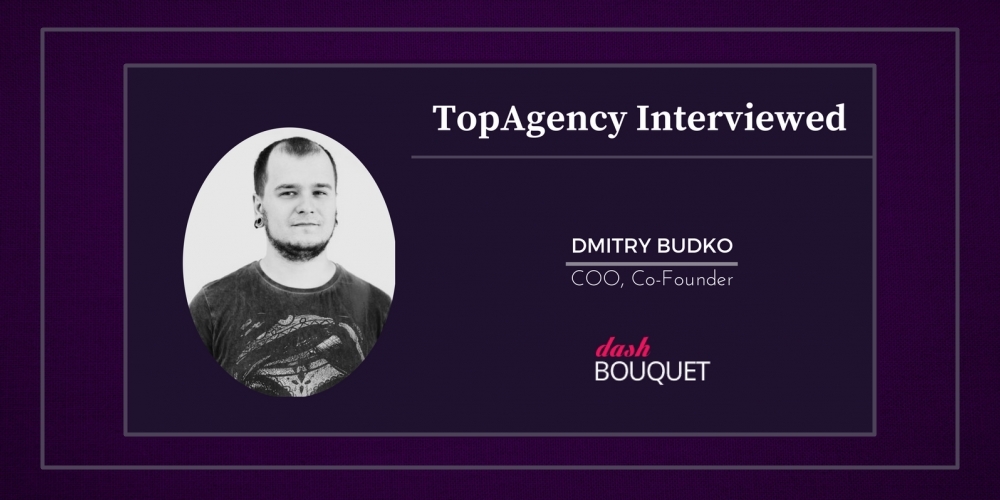We want to share with you an interview of our COO Dmitry Budko for TopAgency, which is one of the independent research-and-review platforms for top technology software service companies.
Link to original source
About the Company
1. Give us a brief description about your company (specialized fields of work, employee strength, roles & responsibilities, clients, and years of service.)
At Dashbouquet, we develop the web and mobile apps, and also specialize deeply in modern JavaScript technologies.
We started in 2014, and have completed dozens of projects since then (more than 60,) of which most went to production. We do full development cycle: from prototype and designs to final testing and market launch, as well as production support. Our team is composed of 23 people right now, and are growing. The team consists mostly of senior-level software developers.
2. How did DashBouquet start and what are your plans for the future?
DashBouquet Development was founded in September 2014. I’m the founder of the company. Before that, I was running several tech startups and had experience in the purchase of several IT services. Mostly they didn’t meet my expectations in terms of timing, flexibility, and proper communication. So the idea was to create a company that would match these criteria and become a good business partner.
Back in the days, we started with a small team of 5 people, and even though we did not have extensive experience, we had a clear vision of how things should be. We found our first clients on elance.com (now UpWork,) and quickly achieved a position in the top 30 out of ~58,000 companies represented there. Our priority has always been in building a partnership network in order to have good references. Such approach has already brought us a lot of good projects and keeps working.
Sure, we have plans for the future. We plan to grow up to 40 people, at the same time focusing on quality, and to get a Fortune 500 company as a direct client.
As JavaScript hipsters, we want to gain more influence in the JS community. We’ve already started to contribute to open-source projects on GitHub, and created our own boilerplate. It is a ReactJS full-stack boilerplate based on typescript with ssr, custom apollo-server, and a huge stack of modern utilities. We’re planning on going this way.
We want to become more local to our customers, open offices in USA, Western Europe, and Asia, and build up a network of affiliates and partners to constantly have a proper workload.
3. Who are your clients and how have they contributed to your success?
There is a punch-line published on our website: “We create beautiful web and mobile apps for worldwide innovators.” So, what does it mean? It relays our intention of working with demanding clients who are eager to have the software that we’re talking about. We don’t want to work with “another-Instagram” or “another-msqrd” people who don’t really lose anything if the product does not succeed. Our past clients were mainly one-man bands. Few of them have grown bigger. Our current clients are startups from USA, Germany, UK, and Israel. We’re keen on working with startups that meet their pace and style.
4. Which mobile/web apps or tools do you use in your daily routine?
We are a mono-technological company and deeply specialize in modern Javascript and its frameworks. We have strong experience in building iOS and Android apps, as well as web apps.
For front-end (both web, mobile, and desktop,) we use Angular2/4 (if needed, but we prefer React,) Typescript, React\Redux\Saga\-*, React Native, ES 6/7, Webpack, etc. For back-end, we use NodeJS, MongoDB, AWS, Docker, Restful API, GraphQL, Loopback 3, Hadoop, typescript, pusher, neo4j, etc.
We take testing seriously and keep business logic covered with unit tests using Mocha, Jest, Istanbul. We also do integration and End-to-End testing using Cypress.io, Webdriver.io, and Nightmare.js.
We use CircleCi to ensure that every team member is on the same page and nobody is slowing down the working process. It also allows us to save time on fixing bugs in the future.
We use two deployment landscapes (for testing and staging, and for production.) We apply Docker, AWS, Digital Ocean for the same.
We also like to keep a clean track of things as it helps everyone be aware of what’s going on and keep an eye on all processes that take place at each project stage. For that, we use issue tracking system (Youtrack,) and budget tracking system (either Google Spreadsheets or Quickbooks.)
We collect software logs and track crashes with Logentries, Rollbar, or Fabric.
Because we constantly add something new to the project or remove certain elements, it’s crucial that we are able to get access to new versions of the documentation. And Git is a really good tool for that.
Our regular communication includes daily and weekly project status, conference calls, and reports. We use Slack, Skype, Hangouts, Gotomeeting, Email, Phone, and/or whatever our client suggests and approves.
About the Services
5. How do you work towards turning the ideas into reality? (Mobile App and Web Development)
DashBouquet provides a wide range of services, including front-end development, hybrid app development, project rescue, and much more. We can empower your team with high-quality professionals or take full responsibility for a project or its parts, and construct your dream project “from scratch.” We also work on ready-to-use solutions, which can be customized to our client’s needs.
We are a small company, and right from the beginning, we decided not to follow the fashion trends in management. For example, we decided not to implement Scrum from a book or the training, and to create conditions to develop the best practices. To do so, we have formulated our own values for what is good and what is bad. We implemented a technology of retrospectives, which gave us everything else.
What we always try to do is focus on what matters, analyze everything, and keep the communication with our clients ongoing. Our basic principle is: “demonstrate instead of telling a story.”
6. What are the inputs from your team to the clients in order to provide them with the best final product?
As I said, we are focusing on the technology that we use, as well as certain problems that require solution. Such narrow focus helps us to gain the technology expertise in JavaScript. We are also doing our best to minimize the time spent on project delivery.
We prefer to check everything ourselves rather than rely on someone’s opinion, and we constantly decrease losses in communication by getting closer to a problem. The communication process is based on our principle: “Respond to clients immediately. If you don’t know what to say, just let them know when you can get back.” Transparency and collaboration with our clients are the keys.
The best advice I can give is: “ Always listen to your clients and never compare them to any standards. All of them have individual and specific visions and requirements so it is crucial to understand their needs and together find the best solution.”
7. How does DashBouquet tackle app development challenges, technical or otherwise?
Even though we do not use a great variety of tools, we make the most out of the ones we deploy. When we start working on a project, first of all we define the areas of expertise, and then constantly organize meetings on situational training throughout work process. Such approach has a few major advantages: we train extra for the areas that demand our attention, we never stop learning, and we try to apply newly gained knowledge to similar projects. Because our focus is quite narrow, we can achieve better results at work that requires specific knowledge.
Our clients expect clear and transparent time/budget project estimations and quick turnaround, sometimes when there a lot of unknowns. Weekly-based iterations allow us to deliver quick and prompt responses to changing requirements.
For example, one challenge that we had on our latest project was to distribute the efforts effectively across an infinite number of aims. To do this, we divided all work into micro budgets, thus allowing the client to track each and every activity down and prioritize it well.
8. How are your after sales services and what services do you offer to support your clients after the product has been delivered?
Almost all of our clients come back and ask to implement additional features, or they have new ideas.
As for the after-production support, we always help our customers a.s.a.p., as well as in case of urgent issues, sometimes even overnights or on holidays. All the services, after-sales and after-production, are made on an hourly basis.
9. Do you succeed in delivering the product within a decided timeline? If yes, how do you manage the same?
We perform initial project estimation based on our experience. The accuracy of this assessment is growing from project to project, and now the estimation error is about +/-25%.
We normally plan two weeks ahead so that we can efficiently manage time and resources, and also have enough time to implement any changes. After this two-week sprint, we meet and carry out a demo, where we present results, share news and updates, and talk about current project status. We also update the clients about the budget, present them a visual change-log, and together plan the next sprint.
10. What kind of Web and Mobile Apps you specialize in?
We don’t have any special domain specialization. We build apps for different areas - Social Networking, Collaboration and Management, Healthcare, Knowledge Management Systems, Finance and Banking, eLearning & Online Training, Uber-like Apps, apps which utilize AI and Machine learning, etc.
About the Industry
11. What are the latest programming trends in the industry, and how do you help in keeping your employees up to date with these technological advancements?
The whole web development arena is moving towards the possible user needs and tries to proact rather than react. There are so many new things to explore and a lot of things to try out during working on the projects. The creativity of developers also plays a major role in “likeability” of their app. We follow the trends and make sure to carefully analyze them. We can confirm that we use innovative technologies, and try to deliver the best product and experience to our clients. Also, a majority of our customers are well-funded startups that always aim at utilizing the latest top-notch technologies. Thus, for example, we had recent experience in AI: an ad tech solution based on computer vision. And one of our current projects is based on IoT technology.
12. Is Belarus a hub of Web and Mobile App Development? Why should one outsource in Belarus?
Belarusian IT-industry has been seeing quite a rise during the last 10 years. Since the High Technology Park was established in 2004, it has been constantly expanding, inhabiting an additional number of residents every year. There are currently over 1000 companies in it that offer a variety of services. Belarus earned the name of an “emerging Silicon Valley of Eastern Europe” and the demand for developers and other IT-specialists is incredibly high. I can name several reasons why Belarus should be a choice for outsourcing. First of all, the development costs are still incredibly low as compared to other European countries and US. At the same time, low costs do not mean low quality of work. Well-known companies do their best to maintain their position on top and they have a lot of cumulative courses for the juniors that ensure outcome and positive development of several professional developers in the future. Not so well-known companies struggle to compete with big players, hence, for them the quality of work is the top priority. One more thing to mention that Belarus is offering a visa-free status for 80 countries, inclusive of a duration of 5 days stay. So if you were thinking to work with a Belorussian company, don’t miss an opportunity to meet your potential business partners in person and see how it works here. Another thing to mention is the low cost of living, as compared to other European and US countries. What is worth mentioning is the high recognition of IT industry in the country. The software industry is among top priorities of the country’s economic development, and universities all over the country have a lot to offer to the students interested in the IT industry. Belarus is a home country for companies such as Viber, World of Tanks, MSQRD, and MAP.ME. Last but not least, of the appreciative advantages of running a business in Belarus, is location. Belarus is a European country and is within few hours of flight from almost all European countries. All outsourcing Belarusian companies also make sure that their specialists speak multiple languages with English being a must, which adds to clear communication, and helps to avoid any misunderstandings.
Minsk, a.k.a. the capital city is not very big in size, so you can actually see almost all of it if you decide to visit. You will also be able to visit a lot of companies, and afterwards, have a couple of drinks with your newly-made friends. It is also worth saying that you should not pay attention to the huge companies only. As I mentioned above, quality is the key factor that plays a major role and startups are showing a lot of flexibility and enthusiasm. Think about this: If hundreds of companies already trust their Belarusian partners, why shouldn’t you?
13. What are your views on RMAD tools?
The RMAD is an appreciative approach for customers who want a small app to advertise their business. If the app is the business itself and solves a user problem in an innovative way, it won’t work.
14. Which is better, according to you, out of the two - Progressive Web Apps or Native Apps, and why?
I prefer the hybrid approach, using React Native, as these apps work in the same way as native apps do (in fact these apps are really native,) but allow to save the budget, support both Android and iOS apps at one time, and have much lower time-to-market.
15. Is there anything else you would like to mention?
At DashBouquet, we tend to think of our clients as of our friends and team members. We will gladly show you around, enjoy a couple beers with you, and afterwards will get down to business and will do our best to deliver a really good quality.
Leave your email to receive our articles and be updated with DashBouquet Development news!



